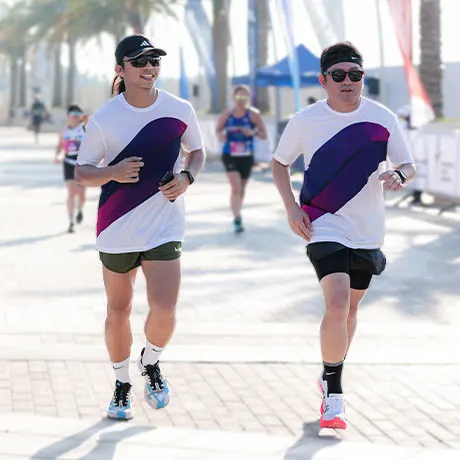Hydration Hacks: Staying Fueled During Your Runs
Posted: 22 March 2025
Staying hydrated is one of the most essential aspects of running, yet it’s often overlooked. Whether you’re training for a half marathon, participating in a virtual marathon, or enjoying a casual run, proper hydration is key to maintaining energy, improving endurance, and enhancing recovery. Dehydration can lead to fatigue, muscle cramps, dizziness, and a decline in overall performance. On the other hand, overhydration can cause discomfort and, in extreme cases, lead to hyponatremia — where the blood’s sodium levels become dangerously low.
Hydration is about more than just drinking water. It involves understanding how your body loses fluids, the importance of electrolytes, the right timing for fluid intake, and choosing the best hydration solutions for your running goals. As sports organizers, Promoseven Sports Marketing places a strong emphasis on hydration — ensuring event setups include strategic water stations and partnering with leading hydration brands. This comprehensive guide will cover the latest trends, practical hydration strategies, and ways to optimize your fluid intake before, during, and after your runs. These hydration hacks will not only keep you fueled but also ensure that you perform at your best and recover effectively.
Why Hydration is Key for Every Runner
Hydration plays a pivotal role in running performance and overall health. When you run, your body heats up, triggering the sweat response to cool down. While sweating is a natural process, it results in fluid loss that can significantly impact your endurance and efficiency if not replenished. Even a 2% loss in body weight from dehydration can lead to noticeable performance declines.
Running increases your metabolic rate, and without sufficient hydration, your body struggles to transport nutrients, regulate temperature, and maintain muscle function. In endurance events like half marathons or virtual marathons, dehydration can result in early fatigue, impaired coordination, and an increased risk of heat-related illnesses.
Hydration is essential year-round, not just in hot weather. Cold environments can suppress thirst cues, leading runners to drink less despite losing fluids through sweat and respiration. Understanding the importance of hydration and implementing effective hydration habits can make the difference between a successful run and one plagued by exhaustion and discomfort.
By prioritizing hydration, runners can improve their stamina, reduce recovery time, and enhance their overall running experience.

Understanding Your Hydration Needs
Hydration isn’t a one-size-fits-all approach. Several factors—such as body size, sweat rate, running intensity, and environmental conditions—determine how much fluid you need. One of the best ways to personalize your hydration plan is by measuring your sweat rate.
How to Calculate Your Sweat Rate:
- Weigh yourself before and after a 60-minute run.
- Track how much fluid you consumed during the run.
- The difference in weight (plus the fluid consumed) represents your sweat loss.
For every kilogram lost, aim to replace 1.5 liters of fluid to rehydrate fully. This method provides a baseline to tailor your hydration needs, especially during longer runs or races.
Climate conditions also influence hydration. In hot, humid environments, your body sweats more to regulate temperature, requiring increased fluid intake. In colder weather, while you may sweat less, you still lose fluids through breathing and should maintain regular hydration.
Understanding your unique hydration needs allows you to fine-tune your fluid intake for optimal performance and comfort during runs.
Pre-Run Hydration: Setting the Foundation
Starting a run properly hydrated sets the tone for your entire workout. Dehydration before a run can lead to sluggishness, early fatigue, and decreased endurance. To avoid this, start hydrating at least 2-3 hours before your run by drinking 500ml of water. This gives your body ample time to absorb fluids and minimize bathroom breaks during your run.
About 15-30 minutes before you start running, consume an additional 250ml of water or an electrolyte beverage, especially if you’re preparing for a longer run. Be cautious not to overhydrate, as excessive fluid intake can lead to bloating or discomfort.
If you’re running first thing in the morning, rehydrate after overnight fluid loss with a combination of water and hydrating foods like fruit. Incorporating natural electrolytes from coconut water or sports drinks with low sugar content can further optimize your hydration levels.
Proper pre-run hydration improves blood circulation, maintains electrolyte balance, and ensures that your muscles function efficiently, allowing you to start your run feeling energized and prepared.
During-Run Hydration: Timing and Techniques
Maintaining hydration during your run is crucial, particularly for runs exceeding 60 minutes. While shorter runs may not require fluid intake, longer distances—such as half marathons or virtual marathons—demand a structured hydration strategy.
General Guidelines:
- For runs lasting 60-90 minutes, aim to drink 150-250ml every 20 minutes.
- For runs exceeding 90 minutes, incorporate both water and electrolyte-rich beverages to replenish lost salts and prevent cramps.
Staying hydrated doesn’t mean guzzling water at once. Sip small amounts consistently to avoid stomach discomfort. Listening to your body’s thirst cues is essential, but don’t solely rely on them, as thirst often lags behind actual hydration needs.
Utilizing hydration tools can make mid-run hydration seamless:
- Handheld water bottles: Ideal for short to medium runs.
- Hydration belts: Offer easy access to small bottles without interrupting your pace.
- Hydration vests: Perfect for long-distance runs, allowing you to carry more fluids and even store snacks.
Test different solutions during training to find what works best for you. Proper during-run hydration helps maintain energy levels, prevents overheating, and supports sustained performance throughout your workout.

Electrolytes Explained: More Than Just Water
While water is vital, electrolytes play an equally crucial role in hydration, particularly for longer runs. Electrolytes—such as sodium, potassium, magnesium, and calcium—regulate muscle function, nerve signaling, and fluid balance. Sweating leads to electrolyte loss, and failing to replenish them can result in muscle cramps, dizziness, and fatigue.
How to Replenish Electrolytes:
- Electrolyte tablets or powders: Easily added to your water bottle for on-the-go replenishment.
- Sports drinks: Offer electrolytes and carbohydrates, though watch for high sugar content.
- Natural sources: Coconut water, bananas, oranges, and salty snacks provide a natural electrolyte boost.
Balance is key. Too much sodium without adequate water can cause dehydration, while too much water without electrolytes can dilute sodium levels in your blood. Finding the right combination of fluids and electrolytes ensures your body stays fueled and your muscles function at their best.
For runners participating in virtual marathons or long training sessions, alternating between water and an electrolyte drink can prevent cramping and help sustain energy levels.
Portable Hydration Solutions: Gear That Keeps You Going
Staying hydrated during a run doesn’t have to be cumbersome. With the right hydration gear, you can maintain your fluid intake without disrupting your stride. The best hydration solution depends on the distance you’re running, the weather conditions, and your personal preferences. Having convenient access to fluids can make a significant difference in your comfort and performance, especially during longer runs or races like half marathons or virtual marathons.
Popular Hydration Gear:
- Handheld bottles: Lightweight and perfect for runs under 10 kilometers. Many feature ergonomic designs with adjustable straps for a secure grip, allowing easy sipping without breaking pace.
- Hydration belts: Equipped with small bottles and pockets for essentials like energy gels, keys, or a phone. They’re ideal for half marathons or long training runs, offering hands-free hydration without excessive bulk.
- Hydration vests: Designed for longer distances, these vests provide ample storage for fluids, snacks, and extra gear. Their weight is evenly distributed, making them suitable for virtual marathons or trail runs.
Test your hydration equipment during training to ensure it doesn’t chafe, bounce, or feel uncomfortable. Some runners prefer handheld bottles for shorter runs, while others favor hydration vests for their capacity and balanced fit. Choosing the right gear not only keeps you hydrated but also enhances your comfort, efficiency, and overall running experience.
Fueling with Hydrating Foods
Hydration isn’t limited to what you drink—certain foods can significantly boost your fluid intake while providing essential nutrients for energy and recovery. Incorporating water-rich foods into your diet helps maintain hydration levels, especially during training for endurance events like half marathons or virtual marathons.
Top Hydrating Foods for Runners:
- Watermelon: Composed of over 90% water, it’s rich in electrolytes and natural sugars, offering quick energy and hydration.
- Cucumbers and celery: Both are low in calories and packed with water, making them ideal pre-run snacks that won’t feel heavy.
- Oranges and grapes: High in water content and vitamin C, they support hydration while boosting immune health.
- Greek yogurt: Offers hydration along with protein to aid muscle repair and replenish energy stores.
- Leafy greens: Vegetables like spinach and lettuce provide hydration and essential nutrients, supporting overall recovery.
Incorporate these foods into your pre- and post-run meals. Snacking on fruit before a run can hydrate and energize you, while a post-run smoothie with Greek yogurt, banana, and berries replenishes fluids, electrolytes, and nutrients. These simple additions to your diet can significantly improve your hydration and overall performance.

Hydration for Different Weather Conditions
Weather plays a crucial role in shaping your hydration strategy. Running in hot and humid environments significantly increases sweat loss, making a higher fluid intake essential to prevent dehydration. In such conditions, proactive hydration and preparation are key:
- Drink cold fluids before and during runs to help lower your core body temperature.
- Wear lightweight, moisture-wicking clothing to enhance sweat evaporation and keep you cool.
- Plan routes with shaded areas or near water fountains to minimize heat exposure and maintain hydration.
In cold weather, many runners underestimate their fluid needs. Despite the cooler temperatures, your body still loses fluids through breathing and sweating. To stay hydrated in colder climates:
- Drink warm fluids like herbal teas before and after runs to replenish fluids and stay warm.
- Wear breathable layers to prevent excessive sweating and overheating.
Pay attention to thirst cues and carry a small water bottle for longer runs, even if you don’t feel thirsty.
Windy conditions can further increase dehydration by speeding up sweat evaporation. Monitoring your sweat rate and adjusting your hydration plan based on weather conditions ensures you stay properly fueled and perform at your best, regardless of the elements.
Common Hydration Mistakes Runners Make
Even experienced runners can make hydration mistakes that negatively impact performance. Avoiding these pitfalls is essential for staying fueled, comfortable, and running at your best.
Top Hydration Pitfalls:
- Overhydrating before a run: Drinking too much water right before running can lead to bloating, discomfort, and frequent bathroom stops. Aim for moderate hydration 2-3 hours before your run.
- Ignoring electrolytes: Failing to replenish electrolytes lost through sweat can cause muscle cramps, fatigue, and decreased endurance, especially during long runs.
- Relying solely on thirst cues: Thirst often lags behind actual hydration needs. Waiting until you’re thirsty means you’re already dehydrated, which can impair performance.
- Consuming sugary sports drinks: While convenient, many sports drinks are high in sugar, potentially causing stomach discomfort and energy crashes. Opt for low-sugar or homemade electrolyte solutions.
- Skipping post-run hydration: Neglecting to rehydrate after a run slows recovery and prolongs muscle soreness. Replenish with water, electrolytes, and hydrating foods within 30 minutes of finishing.
Refining your hydration approach and being mindful of these common mistakes can make a significant difference in both training and race-day performance.
Post-Run Hydration: Replenish and Recover
Rehydration after your run is essential for muscle recovery and restoring fluid balance. Aim to drink 500ml of water within 30 minutes of finishing your run, followed by an electrolyte-rich beverage to replace lost salts.
Pair your fluids with protein-rich snacks, like a smoothie with banana and yogurt or a protein bar, to aid muscle repair. Hydrating foods such as watermelon, oranges, and leafy greens further enhance recovery.
Quick Post-Run Hydration Tips:
- Monitor urine color—pale yellow indicates proper hydration.
- Replenish both fluids and electrolytes to avoid dehydration symptoms later.
- Use a combination of water, electrolytes, and hydrating foods for optimal recovery.
Proper post-run hydration accelerates recovery, reduces muscle soreness, and ensures you’re ready for your next training session.

Conclusion
Hydration is a cornerstone of effective running, from casual jogs to competitive races like half marathons and virtual marathons. By understanding your hydration needs, implementing smart hydration strategies, and choosing the right gear, you can optimize endurance, prevent injuries, and recover more efficiently. Additionally, hydration plays a key role in sports marketing, as well-hydrated athletes perform better, contributing to the success and visibility of sports events.
Promoseven Sports Marketing is committed to supporting athletes and brands in creating impactful connections through sports. Whether you’re participating in a marathon or seeking to enhance your brand’s visibility through sports sponsorship, our expert team provides tailored solutions that resonate with audiences.
Ready to elevate your brand through strategic sports sponsorship opportunities? Partner with Promoseven Sports Marketing today and connect with athletes and audiences in meaningful, lasting ways.
JOIN THE CHALLENGE

November 16
Registration is open.
